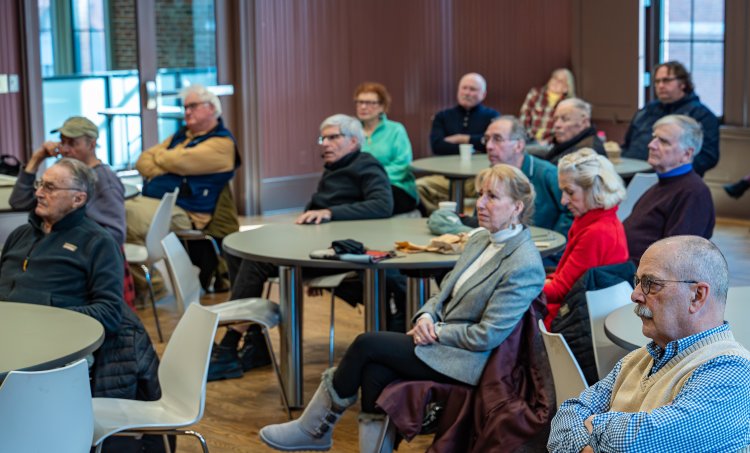
LEWISTON — Before Dan Wathen, former chief justice of the Maine Supreme Judicial Court, sat down for a live chat with a Sun Journal reporter Thursday, he wasn’t sure how he’d be able to wrap up a heavily scrutinized, nine-month process to study Maine’s deadliest mass shooting.
But, as the talk progressed, Wathen opened up about his opinions on the commission’s report, which was released in August of last year.
“We need to confront, we need to have human contact, and have professionals in place,” he said regarding the commission’s main findings, which said the Sagadahoc County Sheriff’s Office and the U.S. Army should’ve reacted more forcefully to warning signs regarding shooter Robert Card.
Wathen, chosen as chair of the seven-member commission established by Gov. Janet Mills in the wake of the shooting, spoke with veteran journalist Steve Collins at the Lewiston Public Library regarding the panel’s work.
Among the report’s chief findings was that the Sagadahoc County Sheriff’s Office likely had probable cause to invoke the state’s yellow flag law and seize Card’s firearms. Wathen also said the Army “wasn’t as forthcoming” with information, downplayed details regarding Card, and failed to carry out instructions given to them by doctors.
The discussion referenced a quote from the report’s introduction from Danielle Jasper, a victim and survivor, which said, “When someone is a danger to themselves, or to the community, do the uncomfortable task and protect us.”
Wathen believes the report shows “less of a systemic failure” and more of a string of personal failures “down the line.” While the commission received some criticism for not making specific policy recommendations, Wathen stands behind what the commission was asked to do.
“The order was to find the facts. We were not commissioned to delve into questions of policy,” he said. “If we had been, I don’t think I would’ve agreed to it.”
He said now policymakers at the Legislature and elsewhere have “a common set of facts they can rely upon to go forward.”
“This tragedy shook the confidence of everybody in the state of Maine,” he said, adding that it’s now difficult to not think of exit strategies when at a large group gathering. “Knowing how this happened, step by step, could potentially bring a sense of healing to Lewiston-Auburn and the entire state.”

Wathen believes policymakers are “just starting to react” to the report, and said he’s pleased that, at least so far, the report has put to rest some misinformation and conspiracy theories that were present following the tragedy.
Wathen also described the immediate response from local authorities “within utter chaos,” which he said “in most respects (was) very commendable.” The local response was “almost instantaneous,” he said, adding, “They went to the gun with no hesitation.”
During the hour-long chat, Collins guided Wathen through the entire commission process, starting with the night of Oct. 25, 2023.
Wathen said he remembers seeing police “streaming by” in Augusta the night of the shooting and that it “never dawned on me” he might eventually be involved. When he got a call asking him to serve, he said he was hesitant but accepted.
“It was one of the more challenging public service assignments I’ve ever had,” he said.
The commission held 16 hearings, several of which featured emotional and heart-wrenching testimony from victims, survivors and their families.
“I’m thankful to the victims, survivors — they came forward and made it real,” he said. “We heard, up front, the horror that these people went through. In many respects, it was more profound than things I’ve heard in court.”
Wathen added that he doesn’t cry in public, “but I tell you, I choked up a few times listening.”
According to his commission bio, Wathen served as a member of Maine’s judiciary for more than 25 years, first appointed to the Maine Superior Court by Gov. James Longley in 1977 and served for four years before his appointment to Maine’s highest court by Gov. Joseph Brennan. Wathen was elevated to chief justice by Gov. John McKernan in 1992 and served in that role until his retirement in 2001.
Since 1990, Wathen has served as the court master to oversee the mental health consent decree.


We invite you to add your comments. We encourage a thoughtful exchange of ideas and information on this website. By joining the conversation, you are agreeing to our commenting policy and terms of use. More information is found on our FAQs. You can modify your screen name here.
Comments are managed by our staff during regular business hours Monday through Friday as well as limited hours on Saturday and Sunday. Comments held for moderation outside of those hours may take longer to approve.
Join the Conversation
Please sign into your Sun Journal account to participate in conversations below. If you do not have an account, you can register or subscribe. Questions? Please see our FAQs.